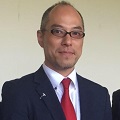福岡 順也 教授

専門・研究テーマ・キーワード
病理学担当課程
博士前期課程専任教員取得学位・資格
医師免許, PhD
他所属
長崎大学大学院医歯薬学総合研究科
経歴
- May/1995 Japanese Medical License Registration No. 375424
- Sep/1999 Japanese License for Autopsy No. 7186
- Aug/2000 Japanese Board of Pathology No. 2210
- Sep/2004 PhD; Doctor of Pathology (Shiga Univ. of Med Sci)
- Dec/2006 Japanese Board of Cytology No. 2370
最近の5つの出版物
- Hashisako M, Fukuoka J. Pathology of Idiopathic Interstitial Pneumonias. Clinical Medicine Insights. Circulatory, Respiratory and Pulmonary Medicine. 2016: 9(Suppl1):123-33.
- Kondoh Y, Johkoh T, Fukuoka J, et al. Broader criteria of undifferentiated connective tissue disease in idiopathic interstitial pneumonias. Respiratory Medicine. 2015; 109(3):389-396.
- Johkoh T, Fukuoka J, Tanaka T. Rare idiopathic intestinal pneumonias (IIPs) and histologic patterns in new ATS/ERS multidisciplinary classification of the IIPs. European journal of radiology. 2015; 84(3):542-546.
- Tabata K, Fukuoka J. Histopathologic features of usual interstitial pneumonia and related patterns: what is important for radiologists? Seminars in ultrasound CT and MR. 2014: 35(1):2-11.
- Tabata K, Tanaka T, Hayashi T, Hori T, Nunomura S, Yonezawa S, Fukuoka J. Ki-67 is a strong prognostic marker of non-small cell lung cancer when tissue heterogeneity is considered. BMC Clinical Pathology. 2014: 14-23.
メッセージ
“Do you have a dream?” Having the right dream is a critical part to being a good leader. Hence, I would passionately teach the importance of having one’s own big dream, along with the pathological approach of global medicine. For global health projects, what we focus on right now are 1) education on the diagnostic approach and ways of extracting ideas for research from routine practice to the pathologists from Asian countries, such as Myanmar, Malaysia, and Vietnam, 2) spreading of digital networks for pathology diagnosis and education to the developing countries, and 3) applying our unique tissue array methods to support difficulties of molecular analysis in developing countries. By providing the specific pathological expertise to the local health centers through above projects, I believe we can contribute to treat global patients.
